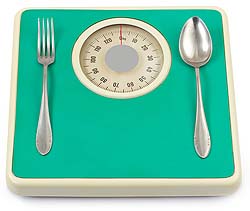When Is the Best Time to Eat
for Weight Loss?
Does the time that you eat make a difference to your weight loss routine, or are calories just calories anyway? The answer: it absolutely does. Your body is an active, sophisticated piece of human machinery that relies on fuel from nutrition to function. It not only matters to eat the right foods, but to eat them at the right time too.
But what is the right time? Well, thatís pretty hard to set in stone, because everybody has different daily schedules. Therefore dedicating set times would not work for everyone. However, the best way to eat at the right times, is to start your own eating schedule and structure it around your day and weight loss goals.

If possible, you should plan your exercise routine first thing in the morning, on an empty stomach and start with your first meal of the day one hour after your exercise session. Try to keep this routine going every day for most days at least. So, letís say you wake up at 5am and you exercise from 6am to 7am. Ideally, your breakfast should be consumed at 8am.
It is important to try and eat at the same time every day as it will help to get your body into a good routine. Following an eating routine like you would appointments in your diary will not only help to keep you sustained throughout the day, but your body will be able to function better if it knows exactly whatís coming next and at what time. Remember your body mechanics are extremely sophisticated and when you fine tune your biological clock, you can use it to help you stay slim and happy.
The best way to eat is to consume six small, portion-sized and balanced meals at two to three hour intervals. You should eat these meals even when you're not hungry, as hunger pangs generally only occur once the body is already in starvation mode.
If we stick with the example above, you would have your second small, balanced meal at around 9am or 9.30am, the third one at 12 noon, the fourth at 2pm, the fifth 4pm and your last meal of the day at about 7pm. You should try to maintain this routine on most days without skipping meals or snacking in between.
Furthermore, if weight loss is your goal, then starving yourself wonít work either. In fact, when you starve your body you are forcing it to go into what is known as ďstarvation modeĒ. This mode increases the production of cortisol and breaks down vital muscle mass to convert it into nutrients for the body to feed off. An overproduction of cortisol leads to excess fat and a lowered muscle mass means less active compounds, which actually help in the fight against fat.
So remember, itís not just about what you eat but how and when you eat it too!
Copyright 2009: Remedium. This article may not be copied, in whole or in part, without the written consent of Remedium.
|